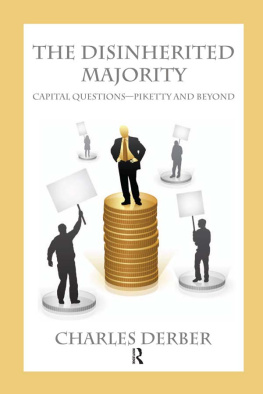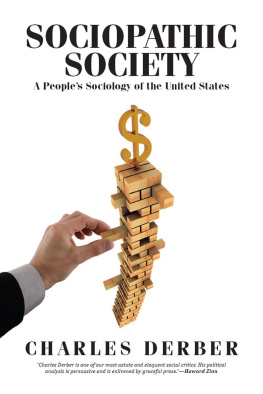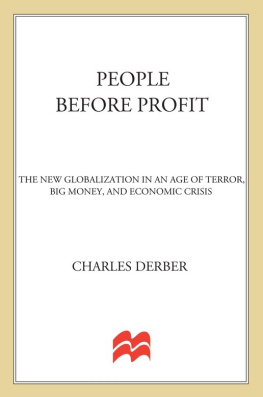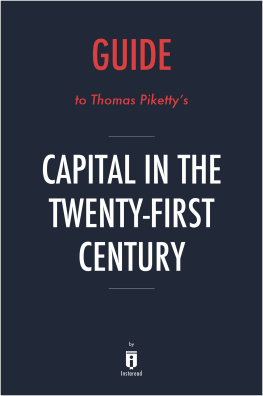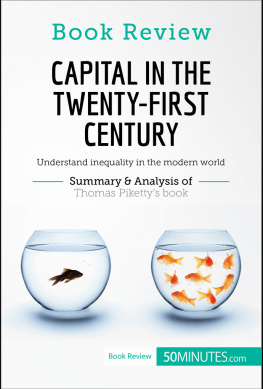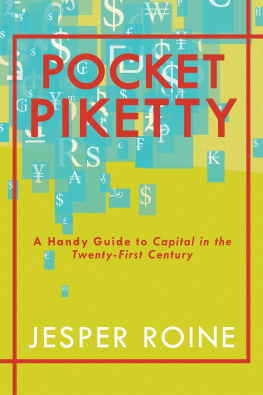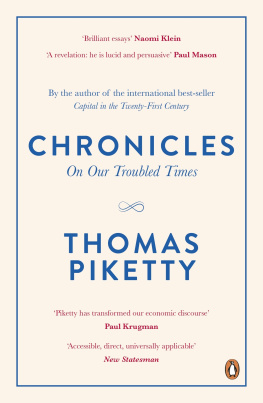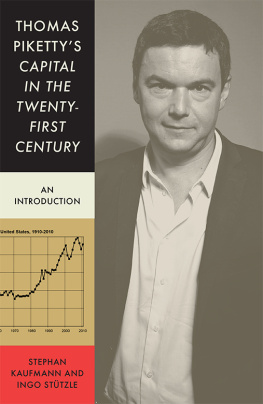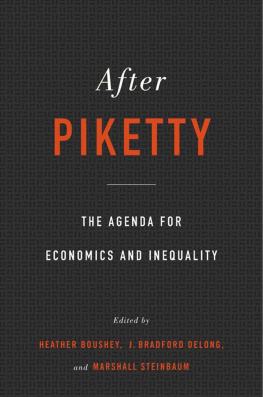THE DISINHERITED MAJORITY
THE DISINHERITED MAJORITY
Capital QuestionsPiketty and Beyond

By Charles Derber
with Interludes by
Juliet B. Schor, Chuck Collins, Josh Hoxie, and Yale Magrass
and
a brief interview with Thomas Piketty

First published 2015 by Paradigm Publishers
Published 2016 by Routledge
2 Park Square, Milton Park, Abingdon, Oxon OX14 4RN
711 Third Avenue, New York, NY 10017, USA
Routledge is an imprint of the Taylor & Francis Group, an informa business
Copyright 2015, Taylor & Francis.
All rights reserved. No part of this book may be reprinted or reproduced or utilised in any form or by any electronic, mechanical, or other means, now known or hereafter invented, including photocopying and recording, or in any information storage or retrieval system, without permission in writing from the publishers.
Notice:
Product or corporate names may be trademarks or registered trademarks, and are used only for identification and explanation without intent to infringe.
Library of Congress Cataloging-in-Publication Data
Derber, Charles.
The disinherited majority : capital questionsPiketty and beyond / Charles Derber.
pages cm
Includes bibliographical references and index.
ISBN 978-1-61205-831-3 (hardcover : alk. paper)
ISBN 978-1-61205-832-0 (pbk. : alk. paper)
ISBN 978-1-31563-514-9 (eBook)
1. Inheritance and succession. 2. Capitalism. 3. Income distribution. 4. Wealth. 5. Social justice. 6. Social history21st century. I. Title.
HB715.D47 2015
332.041dc23
2014035151
ISBN 13: 978-1-61205-831-3 (hbk)
ISBN 13: 978-1-61205-832-0 (pbk)
CONTENTS
I n this book, I offer an analysis of society in the twenty-first century. This is not a modest undertaking, but I have a lot of help, starting with the book by Thomas Piketty, Capital in the Twenty-First Century. His work took the world by storm when published in 2014. It opened up a window into our futureone that is both brilliantly illuminating and deeply alarming for any person concerned with human rights, equality, and social justice.
Pikettys book is a jumping-off placea launching padfor this volume. Piketty is raising a set of what I call capital questions about capitalism itself. His capital questions spur a very big conversation, one starting with Adam Smith and Karl Marx, about the kind of economic and political order that we have constructed, one in which the principle of inheritanceand trillions of dollars of inherited wealthmay largely shape our future.
But Piketty is opening rather than closing the conversation. My purpose here is to make my own small contribution to where I think that conversation about capital questionsand the political action that must followshould go. I draw with great appreciation from Piketty, but we must move considerably beyond him to get to answers that will preserve the dignity of billions of people, whom I call the disinherited majority. The disinherited majority makes up most people in the United States and in the world, but it is largely excluded from wealth, power, and the rights to a dignified life. This is a book about how to remake the world of, by, and for that majority.
Here is a brief map explaining how I have organized the book. My introduction starts with a short summary of my own main thesis: about the twenty-first-century crisis of the disinherited majority and how to respond to it. In the rest of the introduction, I summarize Pikettys work because it is the catalyst and instrument for offering you my own analysis. You do not need to have read Piketty to read and enjoy this book, but you are advised to read my introduction (which summarizes Pikettys main findings) if you havent read him, and probably even if you have.
Following the introduction is the main part of the book, fourteen chapters, each of which takes up one capital question or theme. Each chapter begins with a cluster of questions on a key theme. In each chapter, I offer a summary of Pikettys perspective, examine the flood of commentary that he has elicited, and then offer my own way of reframing and diving deeper into the theme in question. My approach is to push beyond the economic framework that Piketty offers, probing much further into the social and political questions that Piketty says are integral to understanding the economy. Piketty is a blunt critic of the limits of his own economics profession, making clear that the study of economics is barren without an equal dose of history, sociology, and politics. But having been trained as an economist, Piketty himself does not offer the strong social and political analysisand medicinethat he argues, correctly, that we desperately need. My hope is to offer a deeper diagnosis of the social and political illnessand glimpses of the twenty-first-century social and political medicine that might start the healing.
Two other elements are part of my map. One is brief commentaries by individuals whose views I deeply respect. Piketty has helped stir the conversation that I want to pursue, but it will take a vast community of scholars, students, and ordinary people to move the conversation in the right direction. To underscore that this is a conversation for everyone, I have included a small number of voices other than mine, who are already thinking on capital questions and working for the disinherited majority. Their voices in the book, highlighted as brief interludes spaced through the work, will make clear that we need a conversation rather than a monologue.
On the same theme, I have put discussion questions for you, the reader, after each of the fourteen capital questions. If it takes a village to undertake this inquiry, it is you, and all your friends, family, and workplace or neighborhood colleagues, who must participate in the conversation. By adding these discussion questions, I am once again trying to say that no single personcertainly not just myselfcan help us find our path into a more equal, sustainable, and democratic twenty-first century. That is the work of all of us.
L et me first thank Thomas Piketty, for writing Capital in the Twenty-First Century. I wrote this work to continue and help reframe the conversation that Piketty has catalyzed. I want to thank Piketty for his cooperation and willingness to do an interview with me.
I extend many thanks also to my publisher and friend, Dean Birkenkamp, founder and director of Paradigm Publishers. He has supported me generously in every step of the development of this book. Dean played an important role in helping frame the argument and organize the various parts of the book. He is the publisher that every author dreams of finding.
I want to thank my friend and colleague, Yale Magrass, for helping me develop the core theme of the book on capitalism as a society based on both caste and class. He has written his own brilliant commentary about capitalism as a caste society, included in this volume. I also thank him for taking the time to go closely over the entire manuscript and offer his comments.
I also want to thank other contributors who added their own voice in commentaries, including my friends and colleagues Chuck Collins, Julie Schor, and Josh Hoxie.
Thanks also to all the folks at Paradigm who were so helpful. And thanks to my always supportive friends and colleagues, David Karp and John Williamson. A special thanks also to Elena, whose keen intellect and love lit the way forward.
W ith the landmark success of his book
Next page
